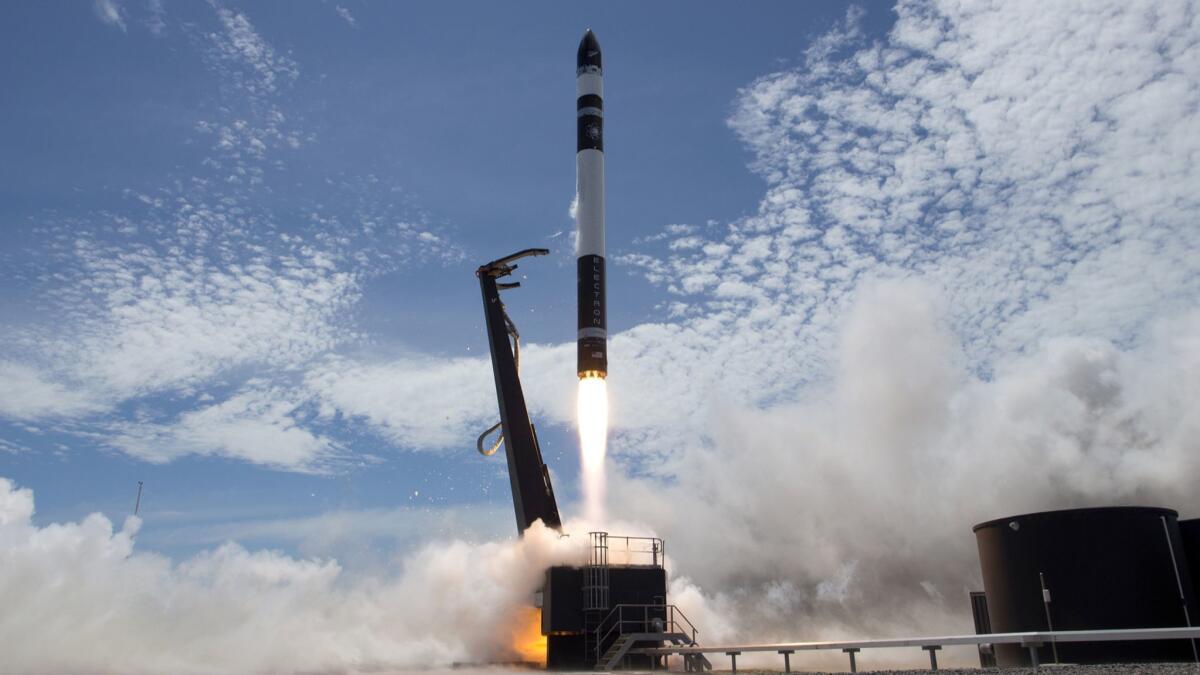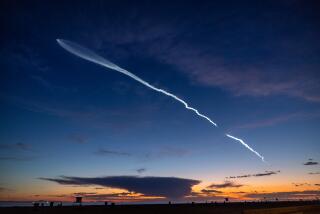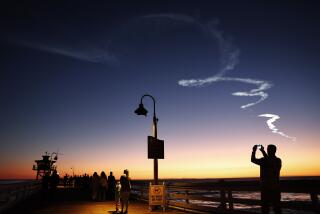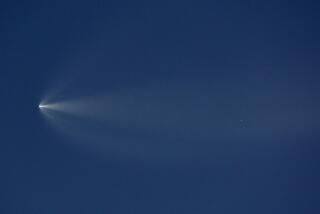Huntington Beach startup Rocket Lab plans to launch small satellites from Virginia coast

Southern California startup Rocket Lab said Wednesday that it will propel small satellites into orbit from Virginia, an endeavor that reflects increasing demand from companies and governments alike to monitor ships, crops and the weather from space.
Rocket Lab said it will build its launchpad at the Mid-Atlantic Regional Spaceport on the Eastern Shore. It’s located at NASA’s Wallops Flight Facility where unmanned cargo missions already are dispatched to the International Space Station.
Rocket Lab, which is based in Huntington Beach and recently built its first launchpad in New Zealand, is setting up in Virginia at a time of unprecedented growth in the use of smaller and relatively inexpensive satellites.
As small as a loaf of bread, the devices circle Earth for a few years before burning up in the atmosphere. Atlanta-based consulting firm SpaceWorks predicted in January that up to 2,600 of these will need to be launched into orbit over the next five years.
Rocket Lab launch is vote of confidence in small-rocket startups »
The industry is attracting venture capitalists, while firms in China and companies such as Virgin have built launch systems dedicated to the smaller devices. Dozens more are under development.
Rocket Lab has sent up two rockets so far, humorously dubbing those missions “It’s a test” and “Still testing.” The second rocket successfully reached orbit in January.
Rocket Lab’s next commercial mission, known as “It’s Business Time,” is scheduled to lift off from New Zealand in November. Launches from Virginia are set to begin as early as summer 2019.
“We’re not focused on the next flight, we’re focused on the next 100 flights,” Rocket Lab Chief Executive Peter Beck, a New Zealander, said at a news conference in Virginia.
Small satellites have often hitched rides on rockets carrying bigger satellites into orbit or with supplies to the space station. But more firms are offering small satellites their own launches, providing greater control over their schedules and the orbits to which they’re delivered.
Rocket Lab plans to keep costs low by using lightweight, expendable rockets with 3-D-printed engines. The plan differs from those of some other space companies such as Elon Musk’s SpaceX, which uses larger rockets to carry bigger payloads.
Rocket Lab said its cargo in January included an Earth-imaging satellite for Planet, a company that offers clients information on topics such as flooding and deforestation.
Future launches, Rocket Lab said, will serve Luxembourg-based firm Kleos Space. That company says it can help law enforcement officials detect illegal activity, such as human trafficking or illegal fishing, by pinpointing maritime radio transmissions.
NASA also has a contract with Rocket Lab to deliver small satellites.
The launch company’s most famous cargo was perhaps the Humanity Star, a geodesic sphere designed to reflect the sun’s light back to Earth. Beck said he hoped it would remind people to look past daily concerns and face larger challenges like climate change. The Humanity Star fell out of orbit a couple months after the January launch.
Rocket Lab chose Virginia’s state-owned spaceport over other U.S. finalists that included Alaska’s Pacific Spaceport Complex and Florida’s Cape Canaveral. Virginia officials said the location could create 100 jobs as flights increase to once a month.
Currently, there are four companies that have developed six vehicles dedicated to launching small satellites, and dozens more are under development, according to Carlos Niederstrasser, an engineer with Northrop Grumman who tracks the industry. His company also launches small satellites.
Other firms getting into this market include Virgin Orbit, a sister outfit to space-tourism company Virgin Galactic. It has been testing a small rocket that is to launch satellites into space from a 747 jet flying at 35,000 feet above the ground. Chinese firms are also up and running.
Niederstrasser wrote in his 2018 industry survey that the market won’t be able to support most of the new companies. But he said it’s clear that company founders and investors believe there will be room for at least some.






